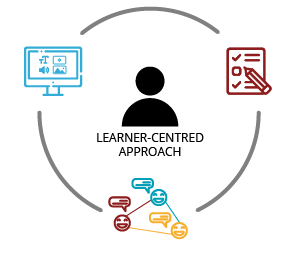3
Perspectives on quality
How do we define quality in online learning? A good starting point is to think about how learners experience their learning online. What things do they appreciate about online learning? What things challenge or trip them up? The Student Voices video presents a chorus of student voices offering perspectives on what matters to them in online learning environments and why.
Student voices
Researchers at the University of Waterloo surveyed over 800 undergraduate students about what they liked, didn’t like, hoped for, and expected from their online courses, and conducted over 100 hours of interviews and user-testing with some of these students. The following video presents a sampling of what they shared (Troop et al., 2020).
Transcript (PDF) | Video length ~ 2 mins.
Online learners LIKE
- flexibility (but can be challenged by self-regulation);
- a mix of media (text, images, video, interactions);
- well-structured, easy-to-find content and assignments;
- content presented in short(er) segments; and
- connections with instructors and peers.

Credit: University of Waterloo
As mentioned above, our starting point for defining quality in online learning is grounded in the experiences and learning needs of our learners. We call this a learner-centred approach to course design rather than a content-centred approach.
Let’s explore this concept in more detail.
What is learner-centred design?
Learner-centred design places learners and their ability to learn at the centre of the course design process. In learner-centred design, the focus is on designing a course in a way that effectively supports and facilitates learning. As such, it is firmly grounded in evidence-based principles from the cognitive and learning sciences that have been shown to facilitate learning and help learners be successful in achieving the learning outcomes set out for them.
Robert Mills Gagné was a professor of psychology and educational psychology who conceptualized the Nine Events of Instruction framework. To learn more about Gagné, read his biography.
While course design frameworks such as the Nine Events are a useful way to efficiently and effectively design your high-quality online course, no framework is complete on its own. An important aspect of learner-centred design that we will highlight throughout this course is Universal Design for Learning (UDL). UDL provides a set of research-based principles to ensure that we appropriately address the learner diversity in our courses and minimize barriers to learning, ensuring that “all learners can access and participate in meaningful, challenging learning opportunities” (CAST, 2018). The Module 1 Resources for Further Study section provides more information about UDL, and later in the module, we’ll be looking at some UDL-inspired examples of how to adapt course design to the needs of our learners.
When considering quality in online courses, think about your learners and their experiences when learning online. Focusing on the quality of the learning experience you are creating for them is an evidence-based way to help them be successful.
Key questions:
- Why have your learners chosen to learn online?
- What will they need in order to succeed in your course?
- What challenges might they need to overcome with online learning?
- What can you do to facilitate their learning?
The rest of this module will provide guidance in answering these questions.

